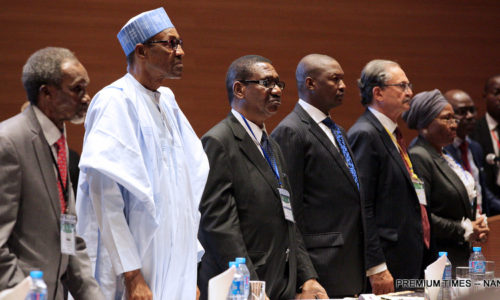
President Muhammadu Buhari on Monday said the judiciary arm of government was yet to perform its functions to the satisfaction of Nigerians given the reforms brought about by the Administration of Criminal Justice Act.
Mr. Buhari stated this at the National Judicial Institute, Abuja, while declaring open a Workshop for Nigerian Judges organized by the Presidential Advisory Committee Against Corruption in conjunction with the NJI.
The President also said the Judiciary must take steps to ensure that it was not perceived as being partisan.
He said Judges must be aware of the sensitivities of the public and take steps towards avoiding even a shred of a doubt regarding their independence.
“In justice, integrity is a necessity. Hence, Judicial Officers and all other members of this sector must always demonstrate manifest integrity,” he said.
Mr. Buhari advised the judiciary to be in the forefront of efforts to develop rights-based jurisprudence as an element in the multi-disciplinary approach advocated in the fight against corruption.
He said as an arm of government, the judiciary had a role to play in the fight against corruption by enforcing the applicable laws.
“Critically important also, is the sacred duty of the judiciary to ensure that criminal justice administration is not delayed,” Mr. Buhari said.
“I am worried that the expectation of the public is yet to be met by the judiciary with regard to the removal of delay and the toleration of delay tactics by lawyers.
“When cases are not concluded the negative impression is given that crime pays. So far, the corruption cases filed by government are not progressing as speedily as they should in spite of the Administration of Criminal Justice Act of 2015 essentially because the courts allow some lawyers to frustrate the reforms introduced by law,” he said.
Mr. Buhari said the scenario such as the one he painted must change for his administration to succeed in its fight against corruption.
The president said he has made the fight against corruption one of the top priorities of his administration in the hope of restoring the economy and build a new Nigeria.
He said in the face of dwindling revenues and in a bid to reposition Nigeria’s economy, ‘it became obligatory to swiftly tackle two ills; waste and corruption’.
He said the eradication of corruption is a joint task involving not only judges and members of the legal profession, but all Nigerians.
“The challenge is to come up with an integrated approach that balances process and substance, promote clarity to ensure a coherent and realistic formulation of objectives.
“To this end, the Judiciary is under a duty to keep its house in order and to ensure that the public, which it serves, sees this.
“Thus, we cannot expect to make any gains in the war against corruption in our society when the judiciary is seen as being distant from the crusade.
“This will not augur well and its negative effect will impact all sectors of society,” he said.
He advised the judiciary to always fight delay of cases in court and to also fight corruption ‘in its own ranks, perceived or otherwise.’
“We expect to see less tolerance to delay tactics used by defence lawyers or even the prosecution in taking cases to conclusion,” he said.
Speaking earlier, the chairman of the Presidential Advisory Committee Against Corruption (PACAC), Itse Sagay, also lamented the incessant delays in the prosecution of corruption cases.
He said the delays allow people with corruption allegations to seek new offices such as the Senate or even governorship which then allowed them immunity from prosecution.
Mr. Sagay, a Professor of Law, said PACAC had so far trained over 160 prosecutors, and had also produced a manual for organized prosecution of corruption cases.
The Attorney General and Minister of Justice, Abubakar Malami, said his office had so far received over 8000 case files from the Nigerian Police for prosecution.
The AGF said the Administration of Criminal Justice Act, ACJA, 2015 had been acknowledged as a revolutionary legislation, adding that what was remaining was its effective implementation.
Mr. Malami also said the act had created value chain across all levels and that there was need to make it a “truly national law”.
The keynote speaker at the event, Justice John Vertes, who is the President of the Commonwealth Judges and magistrates association, said corruption attacks the foundation of most democratic institutions and it often assumes many forms.
“Corruption, regardless of location or language is primarily to extort money or to preserve power,” he said.
Mr. Vertes, who spoke on the theme “Corruption and Development: What the Courts Can Do and Have Done” argued that the cancer of corruption has made economic development in Nigeria to be static.
“Investors are discouraged due to high rate of corruption,” he said.
He also said funding of the Courts should be independent of the executive arm in order to avoid manipulation of judges.
On his part, the Chief Justice of Nigeria (CJN), Mahmud Mohammed, said the workshop was aimed at enhancing the strategies on the adjudication of corruption cases.
Mr. Mohammed said corruption in Nigeria had become complex and could not be solved in isolation.
The CJN said corruption suppresses economic growth and undermine the people’s collective security, while aggravating poverty.
“Corruption cannot be tackled without transparent delivery of justice,” he said.
END

Be the first to comment